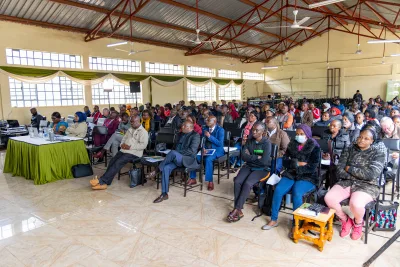By: Wanjiru Ndiritu Members of the deaf community in Nyeri are poised to benefit from the proposed Wildlife Conservation and Mana
By: Wanjiru Ndiritu
Members of the deaf community in Nyeri are poised to benefit from the proposed Wildlife Conservation and Management (Access and Conservation Fees) Regulations, 2025, aimed at promoting inclusivity and equal access to conservation areas.
During a public participation forum at the Nyeri Cultural Center, representatives expressed concerns about the lack of sign language interpreters and inclusive communication in national parks and reserves. They urged the Kenya Wildlife Service (KWS) to ensure that the new regulations uphold accessibility and equity for all Kenyans.
Rahab Wairima, Chairperson of the Nyeri County Deaf Association, welcomed the proposal to exempt persons with disabilities from entry fees when visiting local parks, reserves, marine parks, and sanctuaries. If approved, they will only need to present their National Disability Registration Card for access, unlike in the past when they paid the same fees as other citizens.
Concerns were raised regarding whether KWS would address the communication needs of these visitors. “The main concern is whether KWS has rangers and guides trained in sign language interpretation, or will the deaf be required to bring their own interpreters?” asked Mary Muthoni, a member of the Nyeri County Deaf Association. Cecilia Wambui, another community member from Mweiga, echoed similar concerns about the availability of sign language interpreters.
Other proposed exemptions include free entry for senior citizens aged 70 and above and raising the age limit for free entry for children from three to five years.
If the proposed rates are approved, Kenyans will pay Sh1,500 to access premium national parks such as Lake Nakuru and Amboseli. International tourists will pay Sh11,600, while visitors from other African countries will be charged Sh6,400. For urban and wilderness parks like Tsavo East and West, as well as Nairobi National Park, the fees will be Sh1,000 for Kenyans, Sh10,000 for international tourists, and Sh5,100 for citizens of other African countries.
According to Lucy Muita, KWS’s Senior Assistant Director-in-Charge of Mountain Conservation Area, the Corporation generated Sh7.92 billion against a requirement of Sh19.79 billion in the 2024/2025 Financial Year, leading to a Sh12 billion annual funding deficit. This deficit limits KWS’s ability to fulfill its mandate.
Muita noted that the proposed rates would help ease financial constraints exacerbated by inflation. “The last review was done in 2007, and given the rising costs of fuel, food, and ranger vehicle purchases, revising and enhancing park and conservation fees will help us address various challenges and improve infrastructure and service delivery,” she said.
If approved, this will be the first comprehensive review of conservation fees in 18 years, a long-overdue move reflecting current conservation realities and the urgent need for sustainable financing. As the country moves closer to implementing the Wildlife Conservation and Management (Access and Conservation Fees) Regulations, 2025, the emphasis on inclusivity, sustainability, and equitable access remains central.


COMMENTS